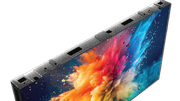Article
McDonald's fecal touchscreens cause outrage
Unsanitary touchscreens found at McDonald's U.K. restaurants sent shock waves across the pond recently, as numerous U.S. media outlets reported that fecal bacteria were found on touchscreens at all eight U.K. locations where the kiosks have been installed, despite the company's claims that the screens are cleaned daily.

December 13, 2018 by Elliot Maras — Editor, Kiosk Marketplace & Vending Times
Unsanitary touchscreens found at McDonald's U.K. restaurants sent shock waves across the pond recently, as numerous U.S. media outlets reported that fecal bacteria were found on touchscreens at all eight U.K. locations where the kiosks have been installed, despite the company's claims that the screens are cleaned daily. The news came as a surprise to most kiosk industry observers interviewed by Digital Signage Today's sister site, Kiosk Marketplace.
The bacteria, found in swipes of kiosk touchscreens at McDonald's locations around London and Birmingham, have raised what many consider to be the first public health concern associated with kiosks — at a time when McDonald's is introducing self-order kiosks.
A McDonald's spokesperson interviewed by QSRweb, a Kiosk Marketplace sister publication, said the screens are cleaned with a disinfectant. It is uncertain at this time what impact the bacteria found in the U.K. will have on the McDonald's kiosk rollout.
The impact could also extend beyond McDonald's and the foodservice industry, as numerous kiosk industry observers interviewed by Kiosk Marketplace have credited the McDonald's kiosk rollout with invigorating interest in self-order kiosks in restaurants and retail establishments.
Metro, a British newspaper, conducted the McDonald's tests with help from London Metropolitan University microbiologists. The test results indicated that:
• The restaurants' kiosk screens were infected with microscopic bugs that can make kiosk users sick if ingested.
• These unseen microorganisms mostly came from human gastrointestinal tracts.
• The bacteria were most likely deposited on kiosk screens by customers who had fecal material on their hands.
• The bacteria stayed on the screen because the kiosk interfaces were not cleaned with the frequency or thoroughness required to destroy the microorganisms between customers.
Dr. Paul Matawele, a senior lecturer in microbiology at London Metropolitan University, told Metro that although the screens are cleaned, the cleaning is not rigorous enough. He said the bacteria can be on the screens "for days on end," and can cause the type of infections people sometimes pick up in hospitals.
People should not eat right after touching the screens, Matawele said.
The samples found traces of bacteria such as staphylococcus, which is contagious, and can cause blood poisoning and toxic shock syndrome, Matawele said. Other bacteria found include: listeria, which can cause listeriosis, which can result in miscarriages and stillbirths in pregnant women; proteus, which can cause urinary tract infections; and klebsiella, which is associated with urinary tract infections, diarrhea and septicemia.
A spokesperson for McDonald's in the U.S. told QSRweb, a Kiosk Marketplace sister publication, "McDonald's assures its customers that regular daily cleaning of our self-order kiosks is policy in all U.S. locations. Our kiosks are cleaned using disinfectant cleaner with a microfiber cloth." The spokesperson did not provide further details nor did she say what procedures are in place in the U.K. and other international locations of the chain.
A McDonald's spokesperson told Metro in the U.K. that its screens are cleaned frequently throughout the day, and that facilities are provided in all restaurants to wash their hands prior to eating.
The bacteria came as a surprise to Reed Stevens, director of vending at Bernick's, a full-service refreshment services company based in Waite Park, Minnesota. The company operates more than 70 micro market kiosks in the Twin Cities.
"This report is something that's going to open eyes for a number of people," Stevens told Kiosk Marketplace. After seeing the report, Stevens decided to have his company's service representatives clean the self-checkout kiosks with disinfectants every time they visit a location. The service representatives have been cleaning the kiosks, he said, but they have not been using a disinfectant.
While Bernick's has been operating micro market kiosks for several years, Stevens said he was not made aware of any need to apply a disinfectant.
Chuck Lewis, vice president of Palmer Digital Group, has been active with different manufacturers deploying self-order kiosks and menu boards for restaurants for several years, but he was not previously aware of bacteria concerns. He pointed out that self-order kiosks are new to QSRs, and the bacteria is an issue that needs to be addressed. He believes daily cleaning should be a sufficient solution.
Sanitation practices already exist for health care kiosks, and they are being applied to some foodservice kiosks, said Crystyl Swanson, vice president of sales and marketing at CSA Service Solutions, which provides preventative maintenance services for kiosks. Swanson said federal regulations specify cleanliness guidelines for hospital kiosks, such as check-in kiosks.
CSA Service Solutions does not have any QSR clients at the present time, Swanson said, but the company does clean Reis & Irvy's self-serve frozen yogurt and ice cream kiosks on a nationwide basis. The kiosks have order touchscreens.
"It's extremely important to have some type of preventative maintenance procedures in place," Swanson said, especially for food distribution.
Swanson said sanitation is a critical issue for all types of customer-facing kiosks, not just health care and foodservice. "There are all these kiosks that people touch all the time," Swanson said. "The awareness around (what) the sanitation looks like is really important."
NSF International, an independent organization that tests, audits, certifies, trains and consults for the food, water, health science, sustainability and consumer product sectors, does not currently have any sanitation standards for customer facing kiosks in a foodservice environment, according to Audra Bildeaux, the organization's senior business development manager for food. Bildeaux told Kiosk Marketplace there is a standard for cleaners for consumer devices such as smartphones and tablets, but not kiosks. The organization's standards are voluntary.
In a presentation at this year's National Restaurant Show, Bildeaux said new sanitation standards will be needed to protect the safety of consumers and foodservice employees as new types of equipment are introduced to the foodservice environment.
The risk of catching an illness from fecal matter from the "everyday" environment is low, according to Dr. Brian Yu, an infection specialist at Advocate South Suburban Hospital in Hazel Crest, Illinois, the hospital reported on its website. He said the best defense is for people to practice proper hygiene. One study found one in six cell phones are contaminated with fecal matter, while other research has noted similar issues with baby toys and cribs, computer keyboards, toothbrushes and a large number of other everyday items.
About Elliot Maras
Elliot Maras is the editor of Kiosk Marketplace and Vending Times. He brings three decades covering unattended retail and commercial foodservice.
 ChatGPT
ChatGPT Grok
Grok Perplexity
Perplexity Claude
Claude






